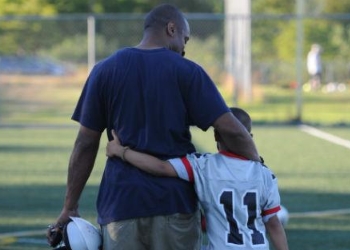
Lie: Faith is a requirement.
Truth: Faith is a necessity.
This article is focused on faith as a concept and why it’s important. For a more complete discussion on how it’s important for salvation and what it means to believe in Jesus, see my article LIE: God only grants salvation to those who have faith in Jesus.
It’s everywhere in the New Testament — throughout we’re called to believe:
. . the time is fulfilled . . . repent and believe the good news. — Mark 1:15
. . these are written that you may believe that Jesus is the Christ, the Son of God, and that believing you may have life in his name. — John 20:31
. . now all who believed were together . . . — Acts 2:44
. . “Sirs, what must I do to be saved?” So they said, “Believe on the Lord Jesus Christ, and you will be saved, you and your household.” — Acts 16:30–31
. . above all taking the shield of faith . . . — Ephesians 6:16
Faith is fundamental to who we are as Christians and its importance is stressed over and over in the scriptures. The question is why? Why is it so important to believe; why do we need to trust? And why is it central and pivotal to our salvation?
But first this question: is it a requirement? or a necessity?
Definitions and distinctions
This all may sound like I’m splitting hairs but it’s an important distinction. Let’s define the words.
requirement – something essential to the existence or occurrence of something else: CONDITION <failed to meet the school’s requirement for graduation>.
necessity – the pressure of circumstance; the quality or state of being in need.
The main distinction between these two words is that a requirement comes down from an authority that imposes on you to be or do something to qualify for something else. But a necessity has no authority imposing it; the necessity arises from nature or circumstance and does not qualify you for something else; rather, meeting the need frees you from the nature or circumstance that presses on you.
For example, the State of Indiana requires you to be 16 years old to drive, but despite that hard and fast requirement, necessity can suddenly trump it and impose on you the need to drive. So even though you’re only 15, when no one else can get your critically injured mom to the hospital, you need to drive, and so you drive.
Requirements impose themselves from the top down; necessities arise from the bottom up. Requirements keep you from getting something until the one who requires it evaluates and approves your claim to have met the requirement. Necessities also keep you from getting something until you simply take the remedy right in front of you. For example, you need to lose weight. No one is requiring you to lose it, but unless you do you run the risk of acquiring diabetes or something worse. Your condition presses on you to lose weight. So what should you do? Simply take the remedy within your own power — don’t eat so much. The solution is right in front of you; it’s been there all along. You just need to take it.[1]

Faith — a necessity, NOT a requirement
So is faith required or needed? Is it required by God to receive salvation? or is faith/trust needed, simply by the fact of our human condition?
Does God check that we’ve got faith to ensure that we’ve met his salvation requirement, without which he will not receive us? He apparently wants us to be his children — he does love us[2] — but is it true that without faith he just can’t or won’t accept us?
You may say that we are commanded to believe and therefore believing must be a requirement. For example:
And this is His commandment: that we should believe on the name of His Son Jesus Christ and love one another, as He gave us commandment. — I John 3:23
Yes, we’re commanded to believe, but commands are not necessarily requirements. For example, to our anorexic daughter we say: ‘Eat!’ But not because we require it, but because we love her and she needs to eat!
The scriptures tell us that all the requirements for our salvation have been met. It’s ‘Jesus plus nothing.’ Now we simply need to believe. This truth — that our salvation has already been won for us on the cross — is spoken by Paul in many places. He speaks this as something that’s happened in the past tense.
But God demonstrates His own love toward us, in that while we were still sinners, Christ died for us. — Romans 5:8
Therefore, as through one man’s offense judgment came to all men, resulting in condemnation, even so through one Man’s righteous act the free gift came to all men, resulting in justification of life. — Romans 5:18
But God, who is rich in mercy, because of His great love with which He loved us, even when we were dead in trespasses, made us alive together with Christ (by grace you have been saved), and raised us up together, and made us sit together in the heavenly places in Christ Jesus, — Ephesians 2:4–6
In Him you were also circumcised with the circumcision made without hands, by putting off the body of the sins of the flesh, by the circumcision of Christ, buried with Him in baptism, in which you also were raised with Him through faith in the working of God, who raised Him from the dead. And you, being dead in your trespasses and the uncircumcision of your flesh, He has made alive together with Him, having forgiven you all trespasses, having wiped out the handwriting of requirements that was against us, which was contrary to us. And He has taken it out of the way, having nailed it to the cross. — Colossians 2:11–14
There is now no requirement because what was required has already been done. Jesus’ death on the cross won salvation for all humanity.
But WHY faith?
So if it’s true that faith is not required from God’s perspective, but is a need from our perspective, then why do we need faith? Let’s restate it this way: ‘why do we need to trust God?’ or even better: ‘Why do we need to overcome our mistrust of God?’
Here’s an analogy: Let’s say you’re a twelve-year-old boy named Corey and your millionaire dad has been wrongly accused of cheating on your mom. The accusation came from an uncle that you love and trust, but you find out, subsequently, that he’s been trying to ruin your dad’s business. But you, being just twelve years old, do not fully grasp all this. You just know that there is now a cloud of suspicion surrounding your dad and it proves to be too much for you. So you run away and now find yourself hungry and living on the street in a bad part of town.
Now let me ask: why does Corey need to recover his faith in his dad?
His dad pleads with his son, whom he loves dearly: ‘Son, believe me, trust me, I did not cheat on your mom!’ Corey’s dad searches high and low for his son. He sends him text messages: ‘where are you?’ ‘please come home!’ ‘I love you!’
The reality is that Corey has access to everything in his dad’s home; everything in his dad’s multimillion dollar mansion is available to him. But it all hinges on whether Corey will trust his dad and come home.

This is a simple picture of our struggle of faith and our condition of mistrust. Our God is constantly and wrongly accused, first by the serpent in the garden and then throughout history. He’s accused of being cruel, domineering, manipulative, capricious, uncaring, absent. But it’s all lies focused on destroying the character of God and consequently our faith and trust in him. The truth is that his true character is the very opposite of what he’s accused of.
Faith is absolutely critical, but it’s not for God — IT’S FOR US! WE NEED FAITH! This article is focused on saving faith, that is, the initial seed of faith we need to receive the reconciliation Christ accomplished for us on the cross. Here Paul says it plainly:
For if when we were enemies we were reconciled to God through the death of His Son, much more, having been reconciled, we shall be saved by His life. And not only that, but we also rejoice in God through our Lord Jesus Christ, through whom we have now received the reconciliation. — Romans 5:10–11
We did nothing to be reconciled to God. That was accomplished through the death of Jesus Christ while we were still his enemies. So from God’s perspective we are reconciled. But we still need to receive the reconciliation, that is, we need to sincerely believe and act in a way that is consistent with being reconciled to God. That’s on our side. And for that we need faith — the restoration of our trust in him.
But this faith, this trust is the same faith/trust that continues to grow so that we can receive more and more of God’s grace and truth; to more faithfully represent him in the world; to grow in the wisdom and knowledge of his good will.
It’s not a question of how much faith God requires, but how much faith do we need? The answer is the smallest amount of faith, a mustard seed of faith, opens the door. And to the degree that we trust him, to that same degree we will benefit from our God and his vast resources. To that same degree, we can touch a hurting world in his name.
Faith is not a requirement, but it is an absolute necessity to be able to accept the love and care of our great God, including his great salvation.
But God, who is rich in mercy, because of His great love with which He loved us, even when we were dead in trespasses, made us alive together with Christ (by grace you have been saved), and raised us up together, and made us sit together in the heavenly places in Christ Jesus, . . . For by grace you have been saved through faith, and that not of yourselves; it is the gift of God, not of works lest anyone should boast. — Ephesians 2:4–6, 8–9
What if we DON’T believe?
In the end, if we fail to believe, what does it really matter whether faith is a requirement or a necessity? And no doubt there are millions, perhaps even billions, who did not, could not or will not believe. What happens to them? in this life and the next?
In this life if we don’t believe, like Corey, separated from his dad, we become miserable and vulnerable and naturally go into survival mode. In time, if Corey doesn’t come home (trust his dad), and survives, at best, he’s likely to become hardened and self-serving; at worst he’s suicidal, filled with anxieties, and non-functional. All the while his heavenly father tries to convince him to come home and that he is his reconciled son. A good father never gives up on his children.

In the next life if we don’t believe, like everyone — no one is exempt — we face the judgment fires for what we have done in this life. In the judgment everything will be revealed and laid bare.[3] The whole truth will finally come out. God will set everything right. Our individual judgment is part of that vindication and righteous judgment. Yet from God’s point of view, because of the fact that ‘when we were enemies we were reconciled to him [God] through the death of His Son,’ that doesn’t change. Our reconciliation to God is objectively true and unchangeable because it’s based on Christ objectively dying on the cross, making provision for his creation.
So in the end, if we fail to believe, ‘each one’s work will become clear; for the Day will declare it, because it will be revealed by fire . . . if anyone’s work is burned, he will suffer loss; but he himself will be saved, yet so as through fire’[4]
The truth is, no one knows what this judgment actually looks like. No one knows its true nature, its duration, its environment, how it will happen. But one thing is sure: it will be absolutely comprehensive and final. In the end, the judgment is not intended to be purely punitive, but restorative. We are ALL reconciled, and if we do not believe, we will suffer loss, but we will be saved, yet as through fire.
For many reasons it’s better to believe in this life.
So we NEED to throw off our mistrust of our Father and come home.
[1] I realize losing weight is more complex than this. It involves other hindrances: availability of good food, good support, age, etc.
[2] For example John 3:16.
[3] See my article What is the judgment of God?
[4] I Corinthians 3:13,15